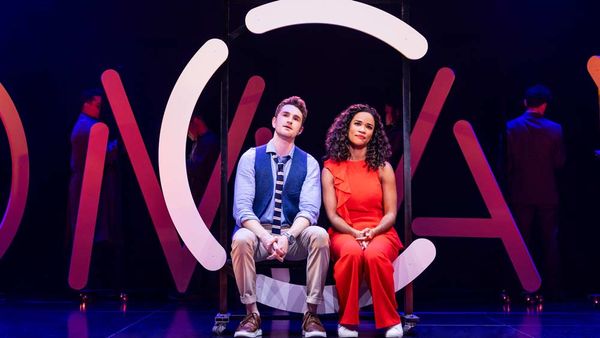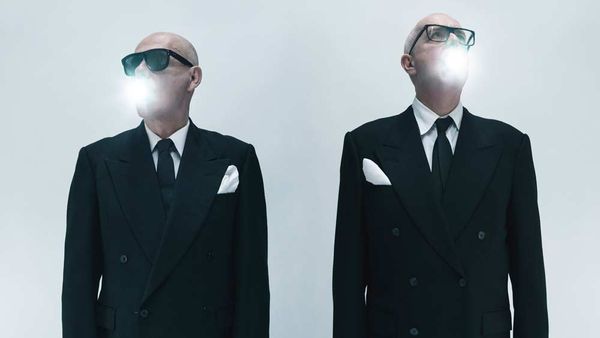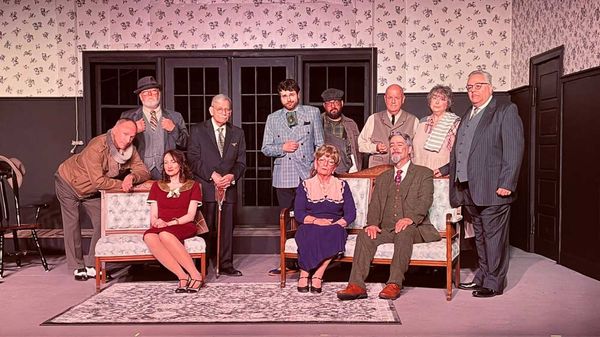
May 1, 2017
Beckett in Brief: Three Short Plays by Samuel Beckett
Kilian Melloy READ TIME: 5 MIN.
How do you present a play -- by Samuel Beckett, no less -- that was initially intended for radio broadcast and offers no visual instruction?
That's online of the technical challenges director James Seymour meets and conquers for the Commonwealth Shakespeare Company's "Beckett in Brief," its omnibus presentation of three one-act plays by the brilliant (but by no means easy) playwright and novelist.
The play referenced above is titled "Rough for Radio II," and was originally written in French. (Beckett himself translated the work into English for its 1976 BBC Radio premiere.) The whole cast participate in this one; Will Lyman, with his resonant and expressive voice, is perfect as "The Animator," a Kafka-esque figure who might represent some nightmarish bureau from a police state, but who might also simply be a figment from a bad dream. The play has been interpreted as a metaphor for the writer's struggle with his material, which seems credible given the nature of "The Animator"'s orders and obsessions, as he badgers a mute man, speaks to a stenographer (Ashley Risteen) in a way that bunches between creepy, high-handed, and solicitous, and interrogates a man named Fox (Ken Baltin), who seems to be a prisoner. What's going on here? Is it a torture session? Some form of consensual play? A culty process designed to break down a new recruit's psyche? It's Beckett, so any or all guesses might apply.
And just how is the radio play visualized here? Let's not spoil anything. Suffice it to say that the auditory emphasis of the play remains intact -- you have to use your imagination to "see" the action completely -- but what you can make out is surreal and even a little alarming., especially when the stenographer, the only female character in the three plays, removes her blouse: The character seems to be equipped with an outrageous falsie.
That's hardly out of character for Beckett, for whom questions of desire and sexuality were mere grist of his mill -- more avenues toward his meditations on futility, pain, time, and mortality. Sex becomes a major element also in the evening's third entertainment, the one-man play "Krapp's Last Tape," in which the titular character (Will Lyman), an elderly man, sits down in his work room for an annual tradition of speaking his thoughts into a tape recorder. This year, prior to committing his musings to his reel-to-reel, Krapp reviews recordings from years past, before critiquing his young self -- but returning obsessively to a highly suggestive narrative about a woman with an alluring scratch on her leg. The pain of time forever receding and taking youthful vigor away with it, leaving the body weary and the soul parched, is palpable in Lyman's tender, sometimes comedic, performance.
In between there's an amiable, quite cleverly presented two-hander called "The Old Tune," in which a couple of elderly gents -- Gorman (Lyman) and Cream (Baltin) -- meet at the side of a busy road in an Irish village. The two catch up and reminisce about old times -- there are no explosive revelations, so it takes a while to catch on to the play's theme, which is one of missing the good old days. Remember when just having a rubber hose for cooling water was "a luxury?" How about when the road was quieter and not beset with whizzing automobiles? (Lighting designer Alexander Fetch does an absolutely brilliant job depicting the headlights of passing vehicles, and Elizabeth Callas' sound design could convince you that you were perched on the margin of a freeway.) even the business of lighting up a cigarette is now more biunique than it once was; Cream has lost his lighter and young passers-by take no notice and offer no help to the two older men.
Beckett always gets under my skin. He's hard to parse, but undeniably effective at weighing you down, a snowflake at a time, with the full weight of his poetic, unsettling ideas while also summoning deep currents of wistfulness. The production services the play's nebulous qualities with some fine technical work - not just the sound and lighting designs, but also Chelsea Kerl's costuming (particularly in "The Old Tune") and James Fenton's scenic design (especially in "Krapp's Last Tape").
Perhaps most striking is how different each of the three segments feels -- unsettling and surreal at first, with "Rough for Radio II," then tenderly nostalgic for "The Old Tune," and finally poignant for "Krapp's Last Tape." One wishes to have seen more of Risteen and Baltin, but Lyman commands his three roles with utmost authority and control, and his talent at voice and dialect is a major part of his performances throughout.
CSC has got a new place to call its own these days at the Sorenson Center at Babson College in Wellesley. It's a haul to get out there, but I left feeling that the trip had been well worth it.
"Beckett in Brief: Three Short Plays buy Samuel Beckett" continues through May 7 at the Sorenson Center for the Arts at Babson College. For tickets and more information, please go to http://commshakes.org/performances/performance/172
Kilian Melloy serves as EDGE Media Network's Associate Arts Editor and Staff Contributor. His professional memberships include the National Lesbian & Gay Journalists Association, the Boston Online Film Critics Association, The Gay and Lesbian Entertainment Critics Association, and the Boston Theater Critics Association's Elliot Norton Awards Committee.







